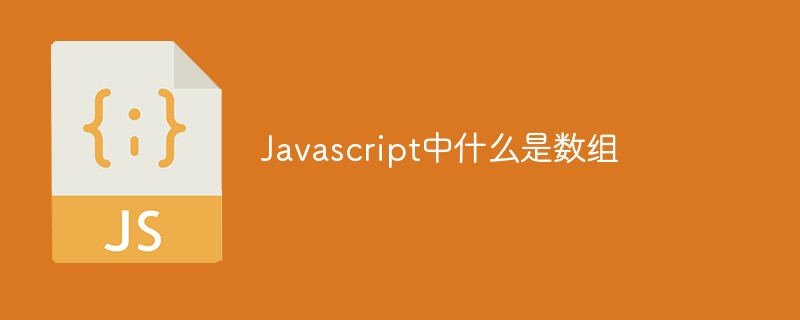
In Javascript, an array is a collection of data arranged in order. Each member of the array is called an element, and the name (key) of each element is called the array subscript. JS arrays can be created in two ways: "[]" and "Array()". The data contained in the array can be of any type.

The operating environment of this tutorial: windows7 system, javascript version 1.8.5, Dell G3 computer.
JavaScript Array (Array) is a collection of ordered data. Each member in the array is called an element (Element), and the name (key) of each element is called the array subscript (Index).
The array can contain any type of data; the length of the array is flexible and readable and writable.
Create Array
There are two ways to define (create or declare) an array in JavaScript: constructing an array and array literal.
1. Constructing an array
When you use the new operator to call the Array() type function, you can construct a new array.
var a = new Array(); //空数组
var a = new Array(1, true, "string", [1,2], {x:1,y:2}); //实数组2. Array literals
The syntax format of array literals: Contain multiple value lists in square brackets "[]", with commas between values Separate.
var a = []; //空数组
var a = [1, true, "0", [1,0], {x:1,y:0}]; //包含具体元素的数组Accessing the array
The array is composite data. The array name is a reference variable pointing to the array, so the array is a reference object. .
Accessing an array is accessing array elements. The elements are equivalent to variables. The elements of the array are a set of variables arranged in an orderly manner. They have no identifiers and are indexed by subscripts. The subscripts start from 0 and increase in order. Note that the array subscript is a non-negative integer expression or a character number, and cannot be other types of values or expressions.
Use square brackets [] to read and write arrays. The left side of the brackets is the array name, and the brackets are the array subscript.
数组[下标表达式]
A subscript expression is an expression whose value is a non-negative integer.
Example 1
The following code uses square brackets to write data to the array, and then reads the value of the array element.
var a = []; //声明一个空数组 a[0] = 0; //为第一个元素赋值为0 a[2] = 2; //为第三个元素赋值为2 console.log(a[0]); //读取第一个元素,返回值为0 console.log(a[1]); //读取第二个元素,返回值为undefined console.log(a[2]); //读取第三个元素,返回值为2
In the above code, only the elements at subscript 0 and 2 are assigned values. The element with subscript 1 is empty. The return value of the element that is empty when reading is undefined by default.
Example 2
The following code uses the for statement to assign values to the array in batches, where the array subscript is an incrementing expression.
var a = new Array();
for (var i = 0; i < 10; i ++) {
a[i ++] = ++ i;
}
console.log(a);Example 3
The design has two variables and does not require the help of other variables to achieve value exchange.
Generally, to implement variable exchange, you need to define a temporary variable for transfer.
var a = 10, b = 20; //变量初始化 var temp = a; //定义临时变量存储a a = b; //把b的值赋值给a b = temp; //把临时变量的值赋值给b
You can design it like this using an array.
var a = 10, b = 20; //变量初始化 a = [b, b = a][0]; //通过数组快速交换数据
Design Tips
The elements of the array allow the use of expressions. The value of the expression and the value of the element are two different concepts. Essentially, the element is also a variable. , the identifier is the subscript number. In an anonymous array, pass the value of variable b to the first element, then assign the value of variable a to variable b in the second element using an assignment expression operation, and then pass the value of variable b to 2nd element. This process is executed in sequence. The value of variable b is rewritten, and two elements are added to the array. Finally, the square bracket syntax is used to read the value of the first element and assign it to variable a, thereby realizing value exchange. Change.
[Related recommendations: javascript learning tutorial]
The above is the detailed content of What is an array in Javascript. For more information, please follow other related articles on the PHP Chinese website!